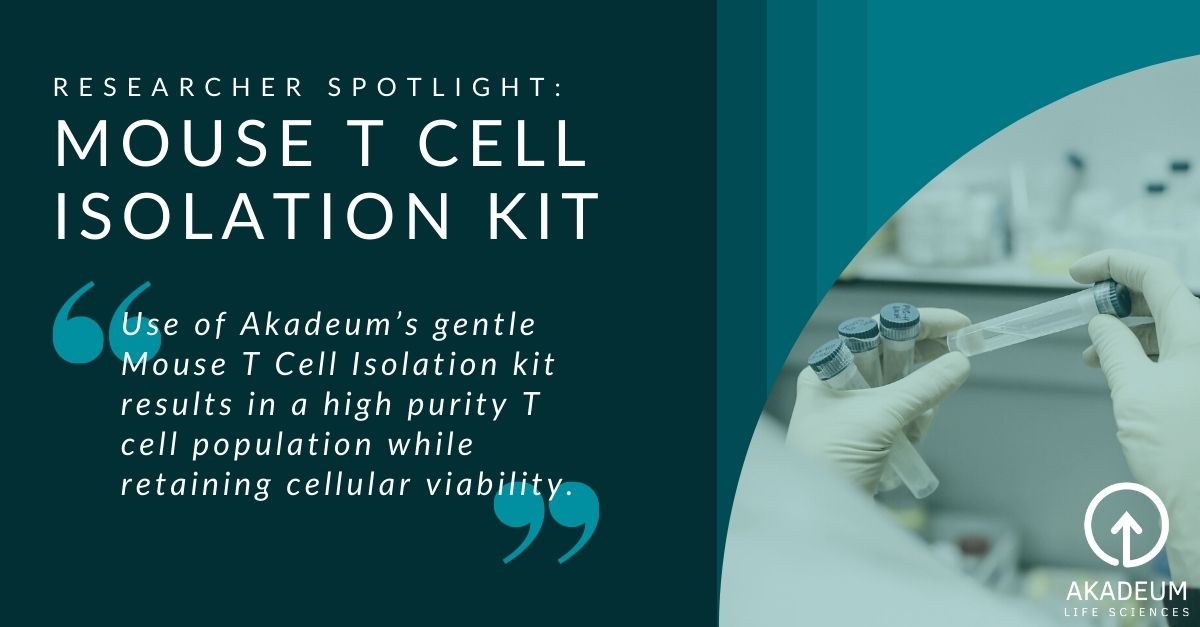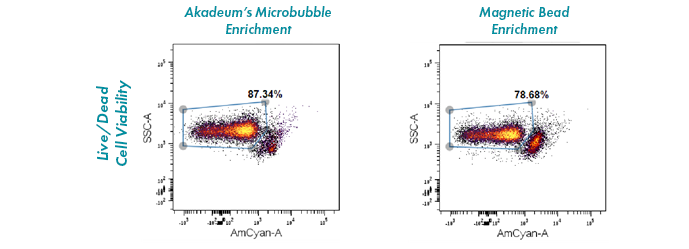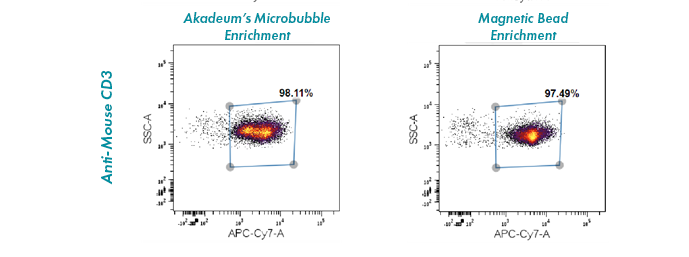Using Akadeum’s Mouse T Cell Isolation Kit to study immunological processes of vaccine mediated immunity
Updated on Nov 5, 2024 Share

Use of Akadeum’s gentle Mouse T Cell Isolation kit results in a high purity T cell population while retaining cellular viability.
Get an inside look at how Akadeum’s products perform in real-world research that is happening in laboratories across the country. A research group, led by Evan Scott at Northwestern University, used the Mouse T Cell Isolation Kit from Akadeum Life Sciences to obtain a high purity isolation of viable, healthy T cells from transgenic mice.
The Scott group investigates basic immunological processes to improve our understanding of the mechanisms involved in vaccine mediated immunity. With the knowledge gained, they intend to use engineering and material-based strategies to rationally design delivery systems targeting key inflammatory cell populations to either elicit or suppress immune responses in a controlled manner. To accomplish their groundbreaking work, they require cell separation methods that yield high quality cells without sacrificing purity. The team was looking to obtain a highly-enriched population of viable T cells from splenocyte samples, and using Akadeum’s Mouse T Cell Isolation Kit delivered an overall T cell purity of >98% while maintaining cell health and viability.
The Akadeum microbubble high throughput T cell enrichment protocol can be performed directly in the sample container for quick and easy sample preparation that does not require additional equipment or expensive consumables like magnets or columns. The microbubble approach is exceptionally gentle on delicate cells and eliminates the need to expose cells to harsh chemicals like lysis buffers or external forces like magnetic gradients from rare earth magnets.
Scope of the Project:
Objective:
Successfully obtain a highly-purified population of viable T cells from C57BL/6-Tg(H2-Kb-Tcra,-Tcrb)P25ktk/J Rag+/- mice, a transgenic mouse model that exhibits reduced numbers of B and CD8+ T cells.
Kit Used:
Mouse T Cell Isolation Kit from Akadeum Life Sciences
Procedure:
Splenocytes were obtained by mechanically dissociating spleens of C57BL/6-Tg(H2-Kb-Tcra,-Tcrb)P25ktk/J Rag+/- mice and filtering through a 70um nylon cell strainer. The resulting sample was enriched for T cells using Akadeum’s Mouse T Cell Isolation Kit or the equivalent magnetic bead kit following kit instructions.
Key Takeaways:
In this head-to-head comparison with a magnetic bead-based protocol the Akadeum protocol produced a more viable cell population (87% vs. 79% viability), with >98% T cell purity in the enriched sample.
Outcome:
The sample preparation using Akadeum’s Mouse T Cell Isolation Kit delivered an 8.66% higher population of viable cells as compared to magnetics. The final enriched sample demonstrated >98% T cell purity, providing the research team with a highly-purified sample of viable cells for downstream processing and analysis.

Figure 1: Dot plots from flow cytometric analysis of isolated T cells. Doublets and debris were excluded prior to analysis. Akadeum microbubble enrichment resulted in 87.34% cell viability, compared to magnetic bead enrichment, which resulted in 78.68% viability. The microbubble protocol demonstrated an overall improvement of 8.66% in live cell population post-enrichment.

Figure 2: Dot plots from flow cytometric analysis of isolated T cells. Doublets and debris were excluded prior to analysis. Of the live cells obtained post-enrichment, Akadeum’s microbubble protocol delivered 98.11% T cell purity as compared to 97.49% T cell purity obtained with magnetic bead enrichment.
Akadeum’s Mouse T Cell Isolation Kit delivers a highly enriched population of viable T cells using a protocol that is fast, easy, and gentle on cells. Ideal for processing delicate cells, Akadeum’s novel Buoyancy Activated Cell Separation (BACS™) occurs directly in the sample container without exposing cells to harsh chemicals or harmful shear forces.
If you are involved in cell isolation research, we’d love to hear from you! We are actively seeking new applications for our microbubble technology and would welcome the opportunity to learn more about your research and to discover if our microbubbles could help you in your work. Let’s schedule a time to talk!



